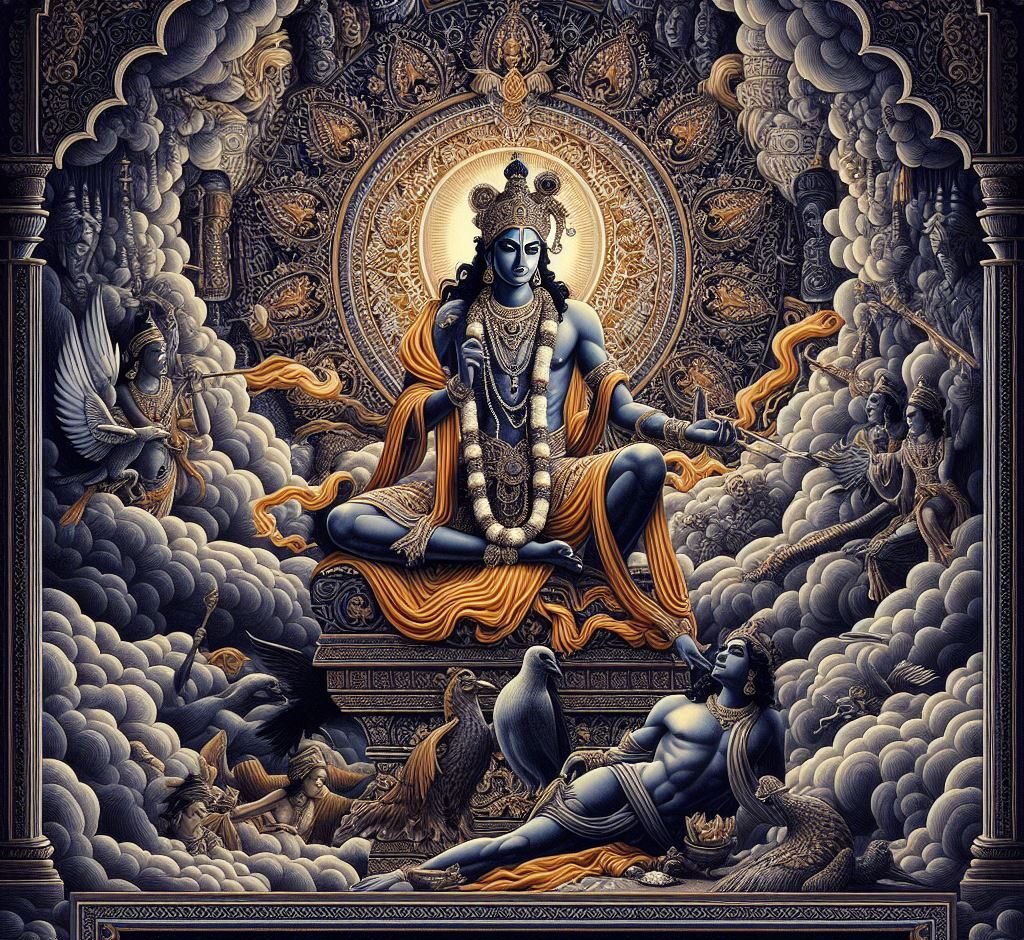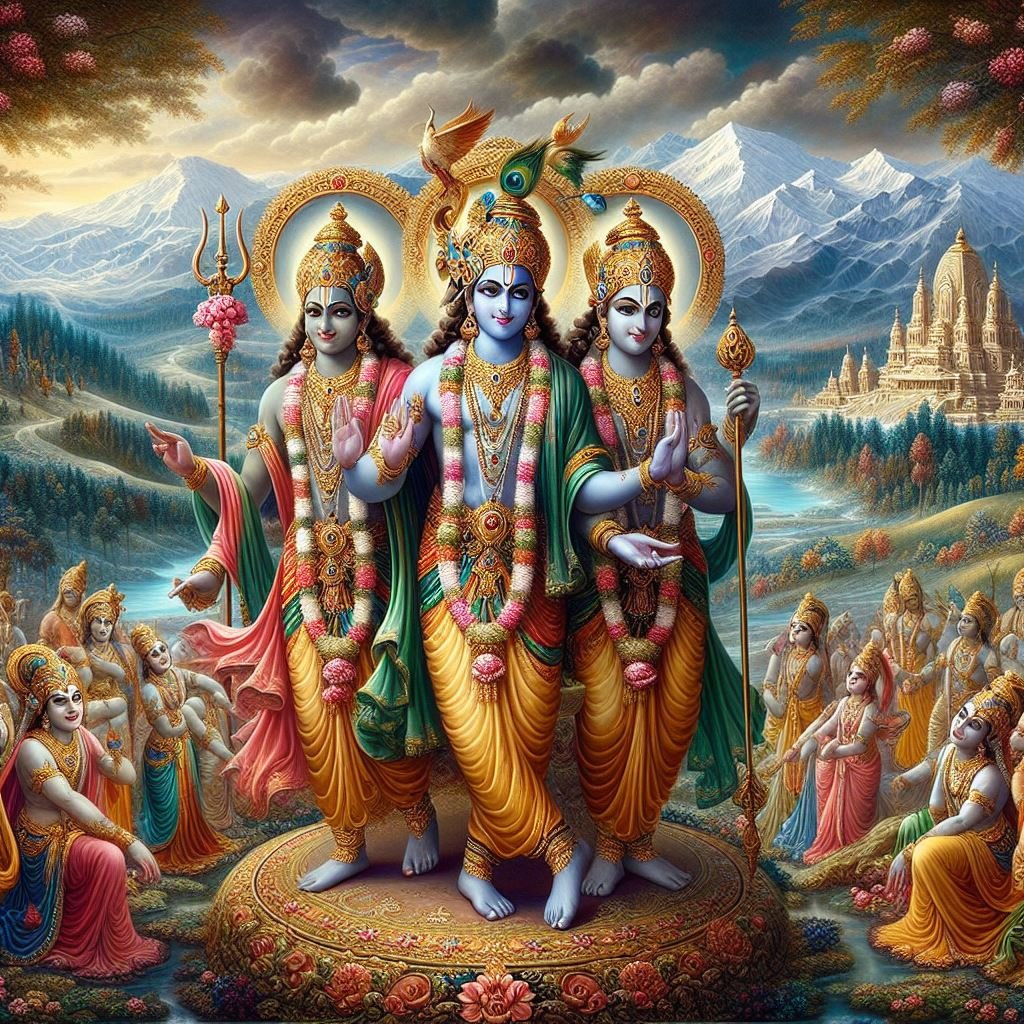No one can abstain from action even for a moment. Indeed, all beings are impelled to act by the qualities inherent in material nature, the three guṇas.
Description
Some individuals erroneously believe that action pertains only to professional duties and not to daily activities like eating, drinking, sleeping, waking, and thinking. Hence, when they renounce their professions, they consider themselves free from action. However, Shree Krishna defines all activities involving the body, mind, and speech as actions. Thus, He informs Arjun that absolute inactivity is unattainable even for a moment. Merely sitting, lying down, or sleeping constitutes activity; even in dreams, the mind remains engaged, and during deep sleep, bodily functions persist. Consequently, Shree Krishna asserts that for humans, achieving a state of complete inactivity is unfeasible, as the body-mind-intellect complex is compelled by its inherent composition of the three guṇas (sattva, rajas, and tamas) to engage in worldly actions. The Śhrīmad Bhāgavatam echoes a similar sentiment:


कोई भी व्यक्ति एक क्षण के लिए भी कर्म से विमुख नहीं हो सकता। दरअसल, सभी प्राणी भौतिक प्रकृति में निहित गुणों, तीन गुणों, द्वारा कार्य करने के लिए प्रेरित होते हैं।
विवरण
कुछ लोग गलती से मानते हैं कि कार्रवाई केवल पेशेवर कर्तव्यों से संबंधित है, न कि खाने, पीने, सोने, जागने और सोचने जैसी दैनिक गतिविधियों से। इसलिए, जब वे अपने पेशे का त्याग करते हैं, तो वे स्वयं को कर्म से मुक्त मानते हैं। हालाँकि, श्री कृष्ण शरीर, मन और वाणी से जुड़ी सभी गतिविधियों को क्रिया के रूप में परिभाषित करते हैं। इस प्रकार, उन्होंने अर्जुन को सूचित किया कि पूर्ण निष्क्रियता एक क्षण के लिए भी अप्राप्य है। केवल बैठना, लेटना या सोना ही गतिविधि है; स्वप्न में भी मन व्यस्त रहता है और गहरी नींद में भी शारीरिक क्रियाएँ बनी रहती हैं। नतीजतन, श्री कृष्ण का दावा है कि मनुष्यों के लिए, पूर्ण निष्क्रियता की स्थिति प्राप्त करना असंभव है, क्योंकि शरीर-मन-बुद्धि को सांसारिक कार्यों में संलग्न होने के लिए तीन गुणों (सत्व, रज और तम) की अंतर्निहित संरचना द्वारा मजबूर किया जाता है। श्रीमद्भागवतम् इसी तरह की भावना व्यक्त करता है:
କ୍ଷଣିକ ପାଇଁ ମଧ୍ୟ କେହି କାର୍ଯ୍ୟରୁ ନିବୃତ୍ତ ହୋଇପାରିବେ ନାହିଁ | ବାସ୍ତବରେ, ସମସ୍ତ ପ୍ରାଣୀ ବସ୍ତୁ ପ୍ରକୃତିର ଅନ୍ତର୍ନିହିତ ଗୁଣ, ତିନୋଟି ଗୁଆ ଦ୍ୱାରା କାର୍ଯ୍ୟ କରିବାକୁ ବାଧ୍ୟ ଅଟନ୍ତି |
ବର୍ଣ୍ଣନା
କିଛି ବ୍ୟକ୍ତି ଭୁଲ୍ ଭାବରେ ବିଶ୍ believe ାସ କରନ୍ତି ଯେ କାର୍ଯ୍ୟ କେବଳ ବୃତ୍ତିଗତ କର୍ତ୍ତବ୍ୟ ସହିତ ଜଡିତ ଏବଂ ଖାଇବା, ପିଇବା, ଶୋଇବା, ଜାଗ୍ରତ ହେବା ଏବଂ ଚିନ୍ତା କରିବା ଭଳି ଦ daily ନନ୍ଦିନ କାର୍ଯ୍ୟକଳାପ ସହିତ ନୁହେଁ | ତେଣୁ, ଯେତେବେଳେ ସେମାନେ ସେମାନଙ୍କର ବୃତ୍ତି ତ୍ୟାଗ କରନ୍ତି, ସେମାନେ ନିଜକୁ କାର୍ଯ୍ୟରୁ ମୁକ୍ତ ବୋଲି ଭାବନ୍ତି | ତଥାପି, ଶ୍ରୀକୃଷ୍ଣ ଶରୀର, ମନ ଏବଂ ବକ୍ତବ୍ୟ ସହିତ ଜଡିତ ସମସ୍ତ କାର୍ଯ୍ୟକଳାପକୁ କାର୍ଯ୍ୟ ଭାବରେ ବ୍ୟାଖ୍ୟା କରନ୍ତି | ଏହିପରି, ସେ ଅର୍ଜୁନଙ୍କୁ ସୂଚନା ଦେଇଛନ୍ତି ଯେ ସଂପୂର୍ଣ୍ଣ ନିଷ୍କ୍ରିୟତା କିଛି କ୍ଷଣ ପାଇଁ ମଧ୍ୟ ଉପଲବ୍ଧ ନୁହେଁ | କେବଳ ବସିବା, ଶୋଇବା କିମ୍ବା ଶୋଇବା କାର୍ଯ୍ୟକଳାପ ଗଠନ କରେ; ସ୍ୱପ୍ନରେ ମଧ୍ୟ ମନ ବ୍ୟସ୍ତ ରହିଥାଏ, ଏବଂ ଗଭୀର ନିଦ ସମୟରେ, ଶାରୀରିକ କାର୍ଯ୍ୟଗୁଡ଼ିକ ସ୍ଥିର ରହିଥାଏ | ଫଳସ୍ୱରୂପ, ଶ୍ରୀକୃଷ୍ଣ ଦୃ ts ୋକ୍ତି ପ୍ରକାଶ କରିଛନ୍ତି ଯେ ମଣିଷମାନଙ୍କ ପାଇଁ ସଂପୂର୍ଣ୍ଣ ନିଷ୍କ୍ରିୟତା ସ୍ଥିତି ହାସଲ କରିବା ଅସମ୍ଭବ, କାରଣ ଶରୀର-ମନ-ବୁଦ୍ଧି କମ୍ପ୍ଲେକ୍ସ ତିନୋଟି ଗୁଆ (ସତ୍ୟ, ରାଜା, ଏବଂ ତମା) ର ଅନ୍ତର୍ନିହିତ ରଚନା ଦ୍ୱାରା ବାଧ୍ୟ ହୋଇ ସାଂସାରିକ କାର୍ଯ୍ୟରେ ଲିପ୍ତ ରହିଥାଏ। Śhrīmad Bhāgavatam ଏକ ସମାନ ଭାବନାକୁ ପ୍ରତିପାଦିତ କରେ:
